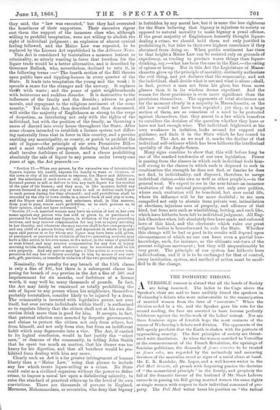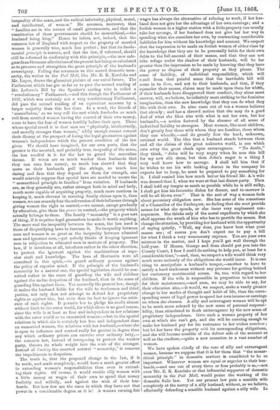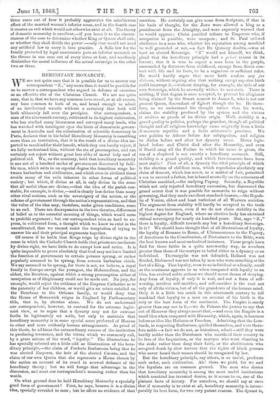THE DOMESTIC THRONE.
ATERRIBLE rumour is abroad that all the bonds of Society are being loosened. The ladies in the Cage above the Speaker's chair are said to have audibily hissed the speakers in Wednesday's debate who were unfavourable to the emancipation of married women from the laws of " coverture." When the division ended in a tie, and the Speaker gave his vote for the second reading, the fans are asserted to have become perfectly boisterous against the trellis-work of the ladies' retreat. Nor are these feminine signs of feverish hope the most ominous of the omens of Wednesday's debate and division. The opponents of the Bill openly proclaim that the Earth is shaken with the portents of approaching anarchy. The first principles of society are threat- ened with dissolution. As when the women marched to Versailles at the commencement of the French Revolution, the uprisings of feminine politicians, the demands of _Antes covertes to be treated as femes soles, are regarded by the melancholy and menacing devotees of the masculine creed as signs of a social chaos at hand. Mr. E. K. Kerslake, Mr. Lopes, and a well known writer in the Pall Mall Gazelle, all preach with despairing passion the doctrine of "the monarchical principle" in the family, and prophesy the fall of the domestic throne of the husband if Mr. Shaw Lefevre succeeds in passing his Bill giving married women the same rights as single women with respect to their individual command of pro- perty. The Pall Mall writer bases his position on "the radical
inequality of the sexes, and the radical inferiority, physical, moral, and intellectual, of women." He assumes, moreover, that "families are in the nature of small governments, and that the constitution of these governments should be monarchical,—the husband being king." Hence he infers, not, indeed, that the common law of England with respect to the property of married women is generally wise, much less perfect ; but that its funda- mental principle is correct, and that the law, if reformed, should still be reformed in conformity with this principle,—the new safe- guards and humane alleviations of the present law being so calculated as to preserve and strengthen the great principle of the husband's sovereignty. Failing due reverence to this sacred domestic mon- archy, the writer in the Pall Mall, like Mr. E. K. Kerslake and Mr. Lopes, draws the gloomiest picture of our social future. The Parliament which has got so far as to pass the second reading of Mr. Lefevre's Bill by the Speaker's casting vote is called a " revolutionary " Parliament,—aud this though the Parliament of 1857, which was certainly not a very revolutionary Parliament, did pass the second reading of an equivalent measure by a larger majority than this has done. In a word, the friends of maaculinism,' as we may call the sect which forebodes so much • evil from married women having the control of their own money, seem to have the fear of women terribly before their eyes. Those whose special creed it is that men are "physically, intellectually, and morally stronger than women," oddly enough cannot conceal their dismay at the prospect of losing the legal guarantees against women's independence which the present condition of the law gives. We should have imagined, for our own parts, that the greater is the asserted, and probably true, inequality of the sexes, the less needful is it for the law to guard the masculine throne. If wives are so much weaker than husbands that they can earn less money, so much less shrewd that they move as their husbands pull the strings, so much less daring and firm that they depend on them for strength, one would scarcely suppose that special laws are needed to secure the "monarchical principle in families" from violation. If husbands are, as they generally are, rather stronger both in mind and body, much more capable of acquiring property, much more cautious in keeping it, much cleverer in resisting family claims upon it, than women, we can scarcely fear the subversion of theirinfluence through giving women the right to control,—we cannot, except gradually by education, give them the power to control,—the property which actually belongs to them. The family " monarchy " is a poor sort of thing, if it requires legal guarantees to make it worth anything. The more real the inequality between the sexes, the less need is there of disqualifying laws to increase it. No inequality between man and woman is so great as the inequality between educated men and ignorant men,—yet nobody thinks of keeping ignorant men in subjection to educated men in matters of property. The law, if it interferes at all, interferes rather in the other direction, to protect the ignorant against the machinations of supe- rior craft and knowledge. The laws of Mortmain were all conceived in this spirit,—to guard ordinary persons against the policy of superior mind. If the principle of the husband's monarchy be a natural one, the special legislation should be con- ceived rather in the sense of guarding the wife and children against the undue despotism of the husband, than in the sense of guarding him against them. Yet assuredly the present law, though it makes the husband liable for the wife to tradesmen and third parties, not only does not attempt to defend her proprietary rights as against him, but even does its best to ignore the exist- ence of such rights. It permits her to pledge his credit almost without limit to the outer world, for which there is no good reason, since the wife is at least as free and independent in her relations with the outer world as an unmarried woman ;—but in the special relations in which she is certainly less free and independent than an unmarried woman, the relations with her husband,—where she is open to influence and control really far greater in degree than any which ordinary priests can exercise over ordinary laity,— the common law, instead of interposing to protect the weaker party, throws its whole weight into the scale of the stronger. Instead of limiting the asserted natural "monarchy," it removes the impediments to despotism.
The truth is, that the proposed change in the law, if it be made, and made completely, would have a much greater effect in extending women's responsibilities than even in extend- ing their rights. Of course, it would enable silly women with a little money or wages of their own to spend that money foolishly and wilfully, and against the wish of their hus- bands. But how few are the cases in which they have not that power in a considerable degree as it is ! A woman earning fair wages has always the alternative of refusing to work, if her hus- band does not give her the advantage of her own earnings ; and a foolish woman in a higher station with a little property eau usually take her revenge, if her husband does not give her her way in spending what she considers her own, by contracting considerable liabilities for him without his knowledge and consent. We suspect that the impression to be made on foolish women of either class by the knowledge that they are to be personally liable for their own debts to the full amount of their means, and that they can not take refuge under the shadow of their husbands, will be far greater than the impression to be made by knowing that they have the power to dispose of their property as they please. The sense of liability, of individual responsibility, which will result from that painful sense that the inevitable bill will come in to them, and not to their husbands, and that, if they squander their means, claims may be made upon them for whith, if their husbands have disapproved their conduct, they alone must answer, will, we believe, be infinitely more striking to the feminine imagination, than the new knowledge that they can do what they like with their own. In nine cases out of ten a woman believes that already ; and has a shrewd notion that she may do a good deal of what she likes also with what is not her own, but her husband's, —a notion fostered by the absence of all sense of individual liability to strangers. Most women, like most children, don't greatly fear those with whom they are familiar, those whom they can wheedle,—and do greatly fear the hard, unknown, external world. The idea that a husband stands between them and all the claims of this great unknown world, is one which cuts away the great check upon extravagance. "No doubt," they think, "John will be very angry when he sees this bill for my new silk dress, but then John's anger is a thing I
very well know how to manage. shall tell him that if he wishes to see his wife looking decent in the company he expects her to keep, he must be prepared to pay something for it. I shall remind him how much better his friend Mr. A.'s wife was dressed than I, when we were at that last dinner party. Then I shall hold my tongue as much as possible while he is still sulky, I shall get him his favourite dishes for dinner, and to-morrow it will be all blown over." That is the sort of way a woman feels about pecuniary obligation now. She has none of the sensations of a Chancellor of the Exchequer, no feeling that she must provide means for what she spends, or else incur very unpleasant con- sequences. She thinks only of the moral expedients by which she shall appease the wrath of him who has to provide the means. But change the situation, by providing her husband with the opportunity of saying quietly, "Well, my dear, you know best what your means are ; of course you don't expect me to pay a bill for what I think a very unnecessary expense. You are your own mistress in the matter, and I hope you'll get well through the half-year. If Messrs. George and Sons should put you into the County Court, I fear I could do nothing to help you, at least for a considerable time,"—and, then, we suspect a wife would think very much more seriously of the obligations she would incur. It is one thing to manipulate a husband's temper,—another to have to satisfy a hard tradesman without any pretence for getting behind her customary matrimonial screen. So, too, with regard to her children. If the wife is responsible in proportion to her means for their maintenance,—and soon, we may be able to say, for their education also,—it would, we suspect, make a vastly greater change in her modes of thought and habit of life, than the corre- sponding sense of legal power to spend her own income or earnings on whom she chooses. A silly and extravagant woman will be apt to be much more sobered by the new sense of personal responsi- bility, than stimulated to fresh extravagance by the new sense of proprietary independence. Give such a woman property of her own at which she can't get, and she will be cunning enough to make her husband pay for his resistance to her wishes somehow ; but let her have the property with its corresponding obligations, and she will become sensible of the debtor side of the account as well as the creditor,—quite a new sensation to a vast number of women.
We have spoken chiefly of the case of silly and extravagant women, because we suppose that it is for them that "the monar- chical principle" in domestic matters is considered to be so important. Wherever women are equal or superior to their hus- bands,—and one out of every three or four probably is so,—not even 'Mr. E. K. Kerslake or that influential supporter of domestic monarchy in the Pall Mall, would praise the working of the domestic Salic law. Yet our present law puts a sensible wife completely at the mercy of a silly husband, without, as we believe, effectually defending a sensible husband against a silly wife. In three cases out of four it probably aggravates the mischievous effect of the married woman's inferior sense, and in the fourth case it creates an evil which would not otherwise exist at all. The theory of domestic monarchy is excellent,—if you leave it to the circum- stances of the case to determine whether King or Queen shall rule, or whether they shall divide the power :—only that would not need any artificial law to carry it into practice. A Salle law for the family protected by legal enactments puts an inferior monarch on the throne in one case out of every three or four, and needlessly diminishes the moral influence of the actual sovereign in the other two or three.
































 Previous page
Previous page